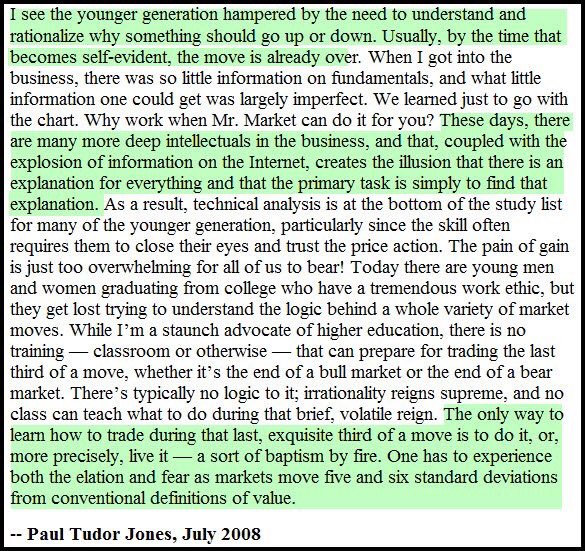
Paul Tudor Jones on going with the chart


 What is the definition of confidence? I define confidence as positive thoughts, feelings and actions reflecting your self-belief and expectations of your ultimate success. Success is never guaranteed, but self-doubt and negativity can ensure failure. When you believe in yourself, you move away from harmful distractions such as anxiety and fear, and you move toward a more effective performance focus. Today, we’ll take a look at how to make sure you’re confident enough to survive the trading game.
What is the definition of confidence? I define confidence as positive thoughts, feelings and actions reflecting your self-belief and expectations of your ultimate success. Success is never guaranteed, but self-doubt and negativity can ensure failure. When you believe in yourself, you move away from harmful distractions such as anxiety and fear, and you move toward a more effective performance focus. Today, we’ll take a look at how to make sure you’re confident enough to survive the trading game.
Aside from the obvious benefits, confidence also bolsters your internal security during trading slumps and gives you additional fuel to persevere through challenging periods. Self-belief promotes traders to create more ambitious performance targets, allowing for greater accomplishment. Traders who display low confidence tend to worry excessively about mistakes, lose focus on what’s driving results, quit trading at the wrong times and get overly worked up about each new trade. Excess confidence can also be dangerous in causing a trader to overcommit capital and be subjected to too much risk when a position goes bad. So your goal should be to promote the internal confidence while still showing the external disciplines to prevent the ego from taking over the consistent execution of a trading method.
Here are seven tips to encourage greater confidence:
1. Frequently visualize a successful trading process. What goes into good trading for you? Make sure you see the preparation required, the focus you have during the trading day, and the continous learning from both winning and losing trades to keep getting more effective.
2. Increase your level of physical fitness, as this will enhance both your trading alertness and give a boost to your self-image simultaneously. Both of these elements make you a more confidence trader.
3. Make a list of your strengths. Review this list regularly to remind yourself of how successful you really are.
4. Eliminate negative thoughts and memories. When they occur, replace them with positive self-statements (for example, “I create my own luck” or “I have a good written plan of how I will execute my trades”).
5. Have a general strategy going into each trading day. When you prepare the day before, you position yourself to be proactive and gain confidence as you implement your plan. How aware are you of what you’re experiencing in your mind, body and soul at any moment? You need to set up a monitoring system at the end of each trading day, to summarize what you executed according to your rules and what you did not. Look for patterns in your behavior, that you can copy if they work for you, or minimize if they are costing you.
6. Create positive body language regardless of the gain or loss on that trading day. The way you act will often influence the way you feel for future trades. The more confident you feel, the more confidence you will show in your trading.
7. Improve on areas of weakness during preparation time and you’ll create more confidence and belief during the trading day.
Focus on one of these seven tips at a time, until you can build that area as a habit in your routine. This will service to greatly improve your trading confidence over time.

Following Fundamentals ,Thinking & Discussing about Economy ,Growth…………..Then ?





“Wisely and slow; they stumble that run fast.” (Romeo and Juliet)
All throughout history we have heard of the triumph of the tortoise over the hare and the mantra that slow and steady wins the race. Shakespeare reminds us of this wisdom and we contend that this mantra is one of the most critical elements of successful investing. Executing a consistent investment plan and process over time is the key to wealth preservation and growth, and we believe that lower volatility strategies (avoiding the stumbles) will generate the highest long-term returns. Higher volatility investments (those that run fast) will have short bursts of outstanding performance, but tend to experience higher frequency and severity of downturns.
The mathematics of loss is not kind to the hares. If you lose (10%), you have to make 11% to get even; lose (20%), you have to make 25%; lose (50%) and you have to make 100% just to get your capital back. Investing in a low volatility strategy requires patience, and Shakespeare had some thoughts on that as well.
“What cannot be preserved when fortune takes, Patience her injury a mockery makes?” (Othello)
Great investors understand the value of patience and follow a disciplined approach. They stay the course, even when going through difficult periods (when fortune takes) and redouble their efforts to remain disciplined when the strategy is out of favor. Great investors know that good strategies (and good investments) will play out well. When the only thing that has changed is the price of an investment, it is time to increase the position, not sell it, and patience will be rewarded over time as the price comes back to reflect the true underlying value. Patience is also necessary in executing long-term focused investment approaches like the Endowment Model.
“Well, God give them wisdom that have it; and those that are fools, let them use their talents.” (Twelfth Night)